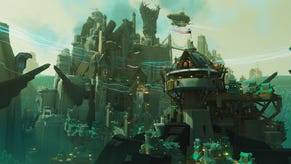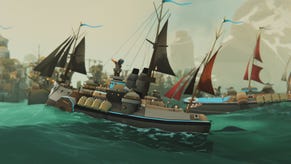Bulwark: Falconeer Chronicles review - meditative city building on a stormy archipelago
Caw.
A gentle and unusual building game that's memorable but missing some purpose.
Bulwark is a city-building game that works differently to any city-building game I've ever played. Faced with the barren rocky outcrops of a stormy archipelago, and a handful of buildings to place on them, I thought I knew what to do. In a sense, I did - I knew I needed to build all over it. But how I'd end up doing that would be in a way completely of the game's own. Bulwark is eccentric. Bulwark is its own thing, for better and for worse.
I expected that, to a degree. To fill you in a bit: Bulwark is the second game in what we now know will be a trilogy - the Falconeer Chronicles - made by solo designer Tomas Sala. The first game, The Falconeer, came out a few years ago and had you fly around a stormy archipelago on the back of a giant falcon. It was an aerial combat game. This second game takes you back to the same stormy archipelago but puts a zoomed out, city-building perspective on it. And the third game, known as Project Ancient Waves, will take us there again in a different way. I like this.
I doubly like it because the setting is one of the things I found so captivating about The Falconeer when I reviewed it. What struck me was how strange and how like the inside of someone's head - Tomas Sala's head - it felt. It was a seascape of fog and clouds and kaleidoscopic hues, as the sun roamed around, lighting it from different angles. It was a seascape of loneliness and not a small touch of desolation, which was echoed in the game's sad story. It was unlike anywhere I'd ever been before, a kind of personal statement of a world, and I thought it showed the creative power a game can have when it's the product of one mind.
I'm delighted to be back in that world again and to see it anew, but the point I'm trying to make here is that Tomas Sala likes to do things differently. And so we circle back around again to the ins and outs of how Bulwark works. It's awkward and obscured by design. It doesn't control like other city-builders, and it doesn't unfold like other city-builders. Honestly, I was confused the moment I picked up the controller the game recommended I play with. Even many hours later, I still contend with it. Mouse and keyboard alleviates this a little, but it's not so much a control thing as a fundamental thing. And ironically, none of this confusion comes from the game being complicated, but from the opposite. It comes from it being incredibly simplistic.
In Bulwark, you can only do a few things. You can place a few buildings and then you can build walls, which make towers, which connect things up. There are no menus anywhere with lists of buildings to choose from, and there's no tech tree anywhere to expand and upgrade with; all of your upgrading happens by clicking on things. Click again on a settlement and it might upgrade; click again on a wall and it might upgrade, click again on a tower and it might upgrade. Governing this is a stream of resources you have flowing around; if you have enough of everything you need, things will grow.
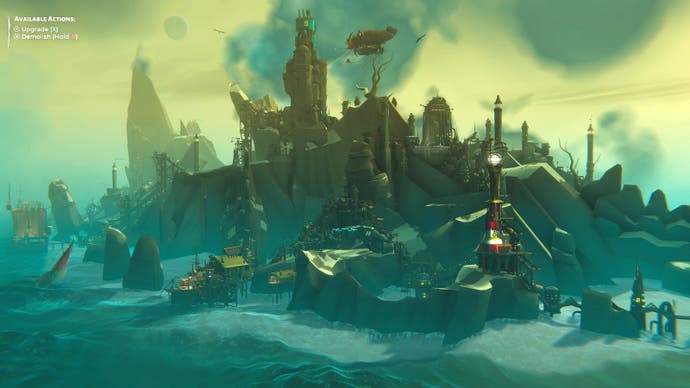
Therefore, all of the intricate, dinky houses you see clinging to buildings, like barnacles on the hull of a ship, and sprouting from walls and towers like plants: those, you do not build. They appear by themselves, dynamically, over time. You build walls and towers and provide the right conditions for them, and then they grow. The plant analogy is quite a good one actually: so much of this game is about scattering the seeds of society over a barren landscape and seeing what will grow.
So what's so awkward about that? Part of it is in the controls. You can't move the camera as freely as you want. Instead, it sticks to buildings and you have to move to and from, one by one. And because the game's default navigation mode is also a kind of building mode, it leads to moments where you build walls and towers by mistake. It isn't intuitive. There is another navigation mode, flying, whereby you take to the air in a little blimp, but you can't move freely there either, having to click to move, which also feels odd and clumsy.
The other part of the awkwardness comes from how things work. Though the game sounds remarkably simple, there's a frustration that comes from a purposeful lack of explanation of anything beyond the basics. Click to upgrade: got it. But how do I harvest more resource? I have been conditioned by strategy games to harvest as much resource as I can possibly find, but here, I can't. I see an abundance of it on my map but when I go there, the game refuses me; I'm told I have three resource extractors already and that's all I'm allowed, and I can't find any apparent way to change that. So around and around I go, for an hour or two, possibly more, wondering what it is I'm actually supposed to do and whether I'm doing it. There's no discernible goal and I'm on no discernible path to it. I'm somewhat aimless. It's the same for so many things in the game.
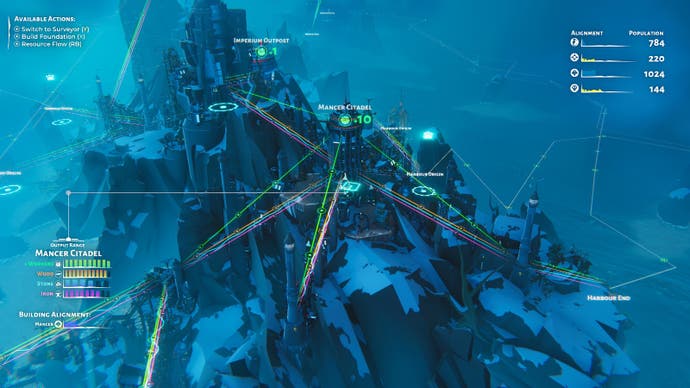
But for all that can be annoying, aimlessness is actually a large part of the point of the game. Just as this is a game that doesn't conform to city building standards, so is this a game that doesn't, um, conform to city building standards. What I mean by that is the win conditions and micro objectives of other games aren't important here - I don't even know if there are win conditions in Bulwark. What's important is the journey. What's important is the journey of discovery as you prod and poke and gently tease the secrets of the game's workings from it. That's why so much is intentionally obscured.
Over time, you'll come to understand the flow of resources around your base and why it's stronger in some areas than others, and what you can do to affect that. You'll come to understand harbours and how settlements work together, and think about trade and maybe war. You'll learn about towers and military force, and relocating settlements you discover as you fly around in your blimp, investigating anomalies. Gradually, you'll layer on understanding and begin manipulating the simulation in a more purposeful way, and it will feel satisfying because you learned how to do it yourself.
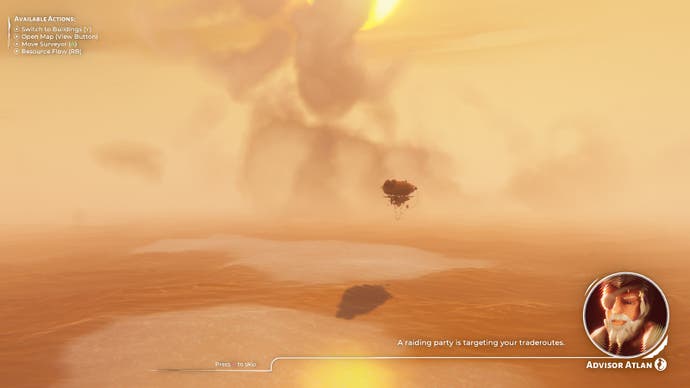
This isn't an experience about holding a dense strategy in your mind, though. I don't think Bulwark wants your head clogged while you're exploring it. Rather, I think it wants your mind drifting while you drift, over the choppy open seas, through the cloud and fog, chimes and gongs ringing gently in your ears, all while you wonder how you might affect the simulation or what life might be like here for the people who live here. There's no stress apart from the occasional pirate attack, which can be easily turned away, and there's no hurry beyond what you set for yourself. Most of the time, you just mooch around, tinkering, pottering, seeing what works and making things look nice. And that's a very pleasant thing to do; Bulwark is a very pleasant place to be.
To compare Bulwark with other city building experiences, then, misses what makes Bulwark uniquely itself. I think of it more as occupying a kind of Townscaper place in city-building: a no-pressure place where you build because it's something nice to do, because it looks and feels nice, and it does look and feel nice. To try and hurry that up or want too much structure from it is to want something else. That's not to say I don't sometimes want more to do in Bulwark, because it can feel empty and limited, and that I wouldn't appreciate a stronger sense of purpose, because sometimes I feel like I'm treading water. It can also be quite elbowy in how it presents itself and controls. But if it were anything else, it wouldn't be this, and I appreciate that more. Bulwark, like The Falconeer before it, is singular, and that counts for a lot.
A copy of Bulwark: Falconeer Chronicles for review was provided by Wired Productions.
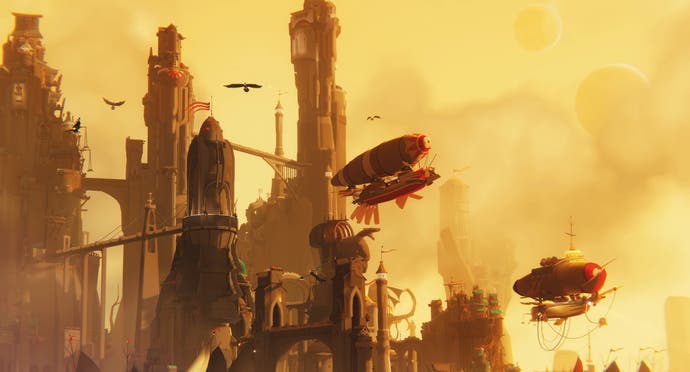

.png?width=291&height=164&fit=crop&quality=80&format=jpg&auto=webp)


